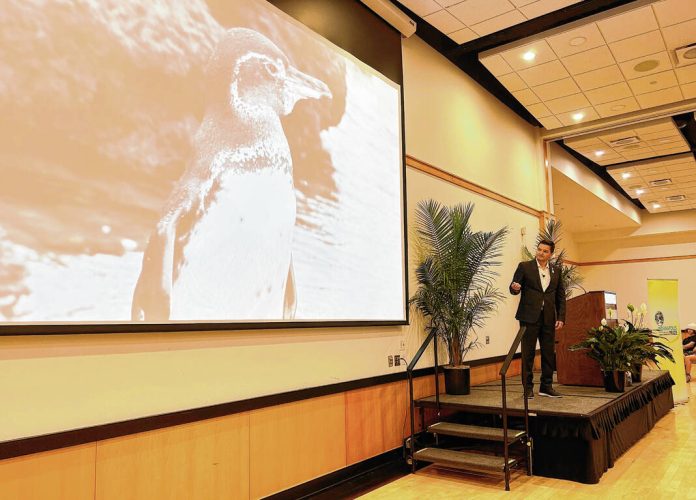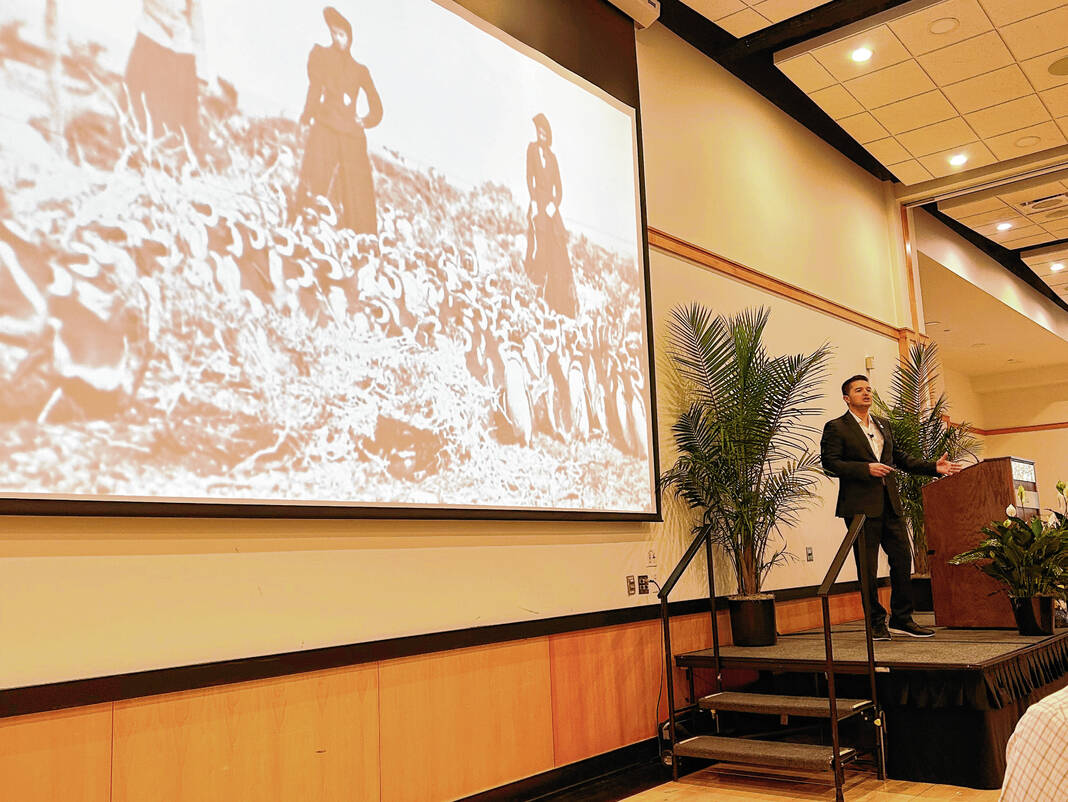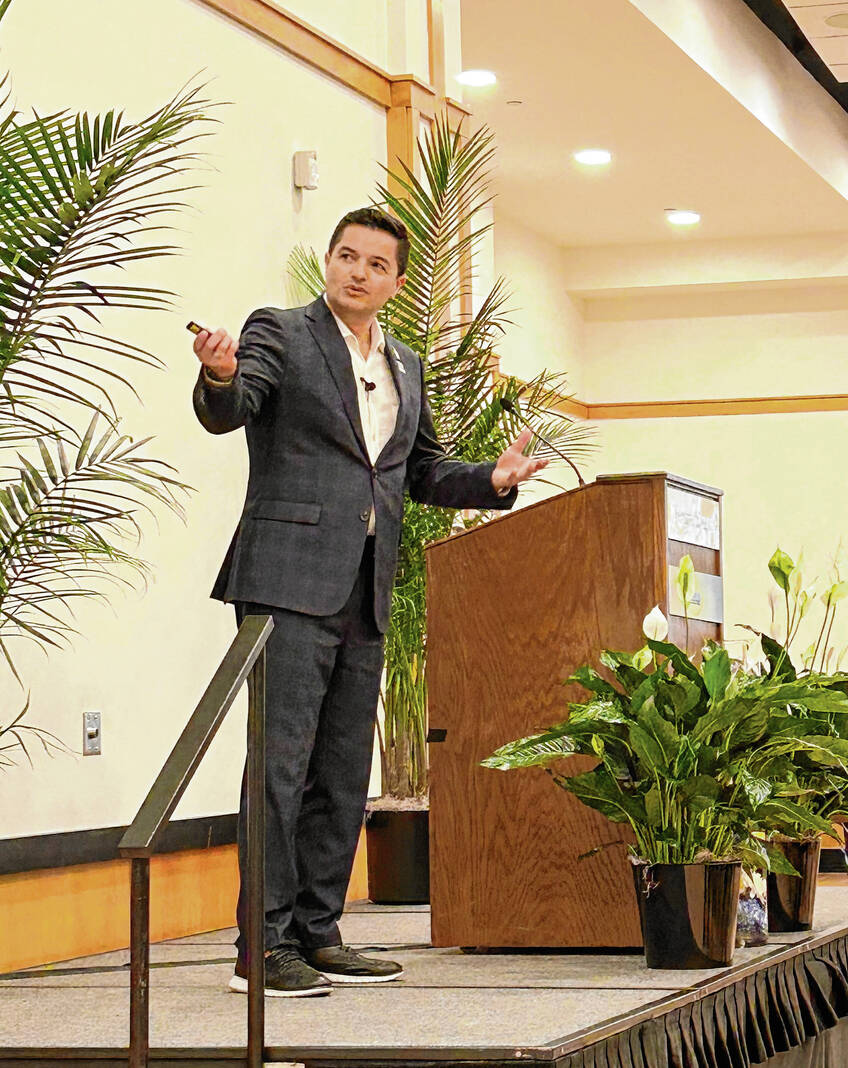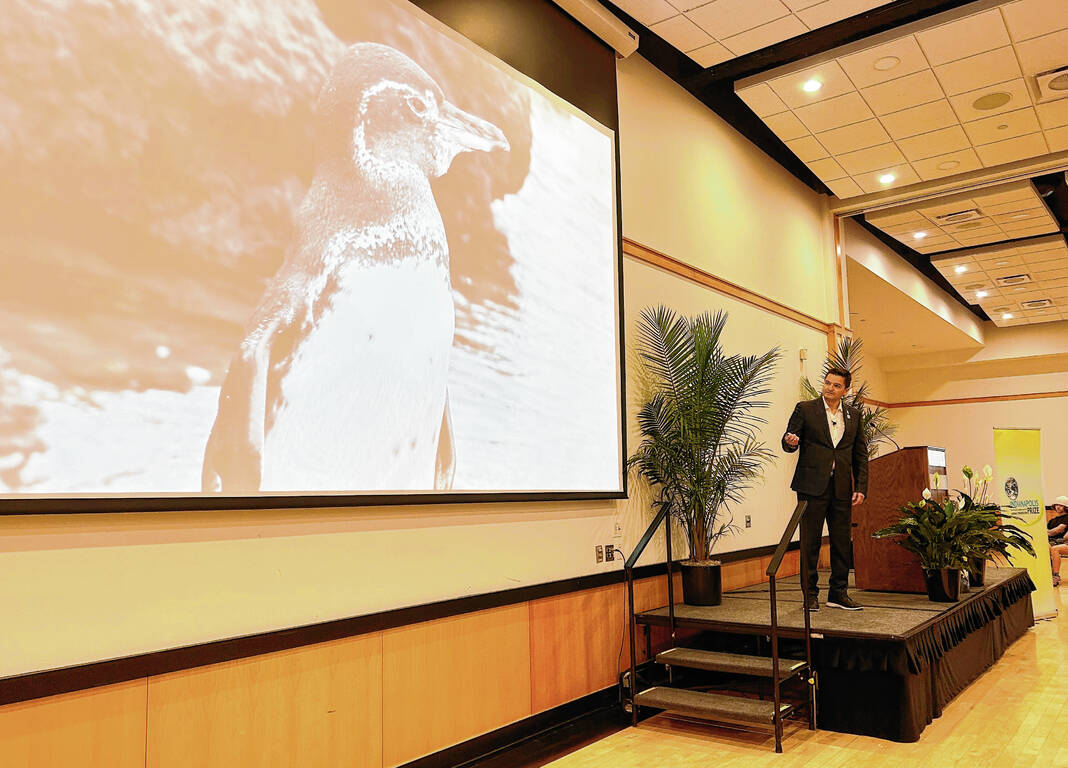
Dr. Pablo Borboroglu, a penguin conservationist and the 2023 Indianapolis Prize winner, speaks about his work during a lecture on Oct. 3 at Franklin College. The Indianapolis Prize is the world’s leading animal conservation award and is given every other year to an individual who has made extraordinary contributions to wildlife conservation.
RYAN TRARES | DAILY JOURNAL
The enthusiasm spilled across the auditorium with every word.
That makes sense coming from Dr. Pablo Borboroglu — a man who has dedicated his life to saving penguins around the world. As he stood in front of the Franklin College audience held captive by his accounts of working with the birds, his dynamic nature conveyed how much he believed in his conservation work.
His excitement had helped make the world a better place, for penguins and for all creatures on earth.
“Penguins are absolutely amazing, absolutely fantastic. I always like to think they are magic — if there is magic in this world, a lot of it is in penguins,” he said.
Borboroglu is the winner of this year’s Indianapolis Prize, the world’s leading animal conservation award. He came to Franklin College on Tuesday to share his experience saving penguins, from the challenges of protecting millions of acres of ocean and coastal habitat to co-founding the Global Penguin Society, an international conservation coalition for the world’s penguin species.
“We are honored to be partnered with the Indianapolis Zoological Society in the celebration of the Indianapolis Prize, the world’s leading award for animal conservation,” said Kerry Prather, president of Franklin College. “Franklin College is proud to be a silver sponsor of this recognition, which reflects our own longstanding institutional commitment to the study of science and the environment.”
Franklin College has been a continued supporter of the Indianapolis Prize, first awarded by the Indianapolis Zoological Society in 2006 to elevate the brave, talented and dedicated men and women who spend their lives saving the earth’s wildlife. The award is given every other year to an individual who has made extraordinary contributions to wildlife conservation.
Borboroglu fits the criteria perfectly. In addition to being a co-founder of the Global Penguin Society, the Argentina resident is the co-founder and co-chair of the International Union for Conservation of Nature’s Penguin Specialist Group, which helps to assess the conservation status and advance international penguin conservation action.
He has also led efforts to create “Blue Patagonia” — a UNESCO Biosphere Reserve — which protects 40% of the global population of Magellanic penguins and is the most biodiverse area of Argentina. Home to 67 species of animals, more than 120 species of birds and nearly 200 species of marine invertebrates, this is Argentina’s largest UNESCO Biosphere Reserve, encompassing 200 miles of coastline and 7.6 million acres of land and ocean. I
In total, Borboroglu has coordinated the development of management plans for eight protected areas since 1998 in Chile and Argentina.
“Dr. Pablo Borboroglu is a protector of ocean and coastal habitats for penguins in several countries, including Argentina,” said Sarah Summers, associate dean for academic affairs at Franklin College. “Dr. Borboroglu works to improve penguin colony management through a configuration of large protected areas, including 32 million acres of ocean and coastal habitat.”
Borboboglu’s lecture, titled “Saving Species: My Life & Work Protecting Penguins,” was part of Franklin College’s 2023-2024 Convocation Lecture Series. This was the second time the college was chosen to host a lecture by the Indianapolis Prize winner. In 2021, the college hosted Dr. Amanda Vincent to discuss marine life research.
On Tuesday, Franklin College students, faculty and community members, as well as representatives from the Indianapolis Zoo, filled the Branigin Room inside the Napolitan Student Center to hear Borboroglu’s story of species survival.
Borboroglu described his journey toward penguin protection — inspiration from his grandmother and her experience with nature; outrage at the apathy about their deaths and struggles, and motivation to make a difference.
“I was shocked in the ’80s, because 40,000 penguins were dying in Patagonia. You’d go to the coast, see penguins dead or dying, coated in oil,” he said. “Then in ‘91, there was an oil spill that hit the coast and 17,000 penguins died in just two months. So after that, I saw I wanted to help penguins, but in a more efficient way.”
In everything he spoke about, Borboroglu’s excitement was contagious. His love for the penguins was evident in the way he spoke about the birds.
But penguins face a rash of dangers in their lives, both natural and caused by humans. Because the birds live both on the coast and the ocean, they are severely impacted by fisheries, pollution, human disturbance and climate change.
Borboroglu outlined the work he’s helped spearhead to protect the birds over decades, from protecting their habitats to educating students and communities about the importance penguins play in the ecosystems.
“One of my main goals in conservation is to improve the management of human activities, so we reduce the impact we put on penguins,” he said.
By creating large protected areas where penguins live, breed and hunt, they can sustain colonies and ensure the different species thrive. At the same time, other animal species in those areas, such as whales, porpoises and sea lions, can benefit.
Borboroglu pointed to one success story. In the same year that he founded Global Penguin Society, he discovered six breeding pairs of penguins at the El Pedral colony on the eastern coast of Argentina.
After successfully designating that area as a wildlife refuge and reducing human impacts, the area is now home to 8,000 breeding pairs of penguins.
“It’s hard to believe that 15 years ago, there were six pairs that were breeding in this area, and now this is how the colony looks. This is a home run, this is amazing. And this is an example that, when we protect places, nature can recover. We just have to give them the chance,” he said.
So many different species around the globe need protection and help in the face of threats, Borboroglu said. But penguins have a unique ability to capture people’s interest, which can start a conservation chain reaction.
“Penguins have a key role in environmental conservation, because they are so ecological important in the environments they use,” he said. “But human beings, we all have a natural emotional connection to penguins. So penguins are the perfect tool to inspire these important changes in behaviors, the actions and the changes of people.”







